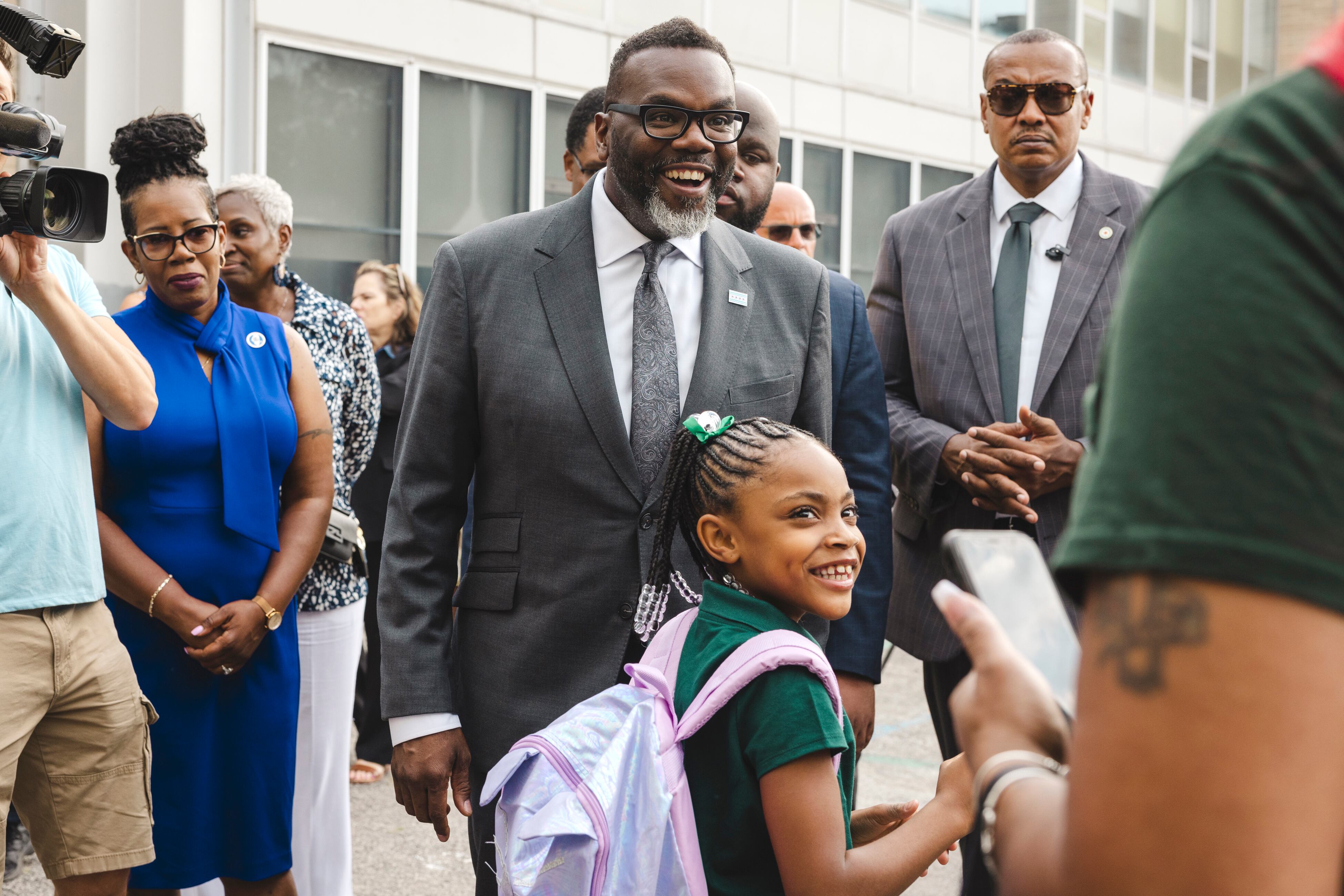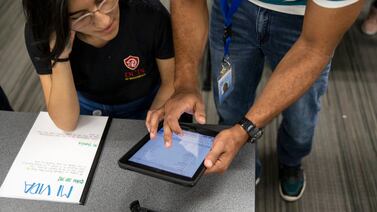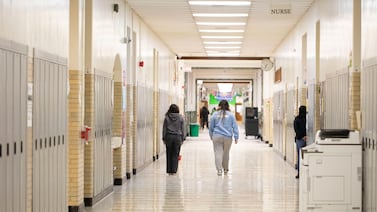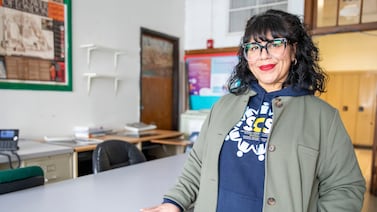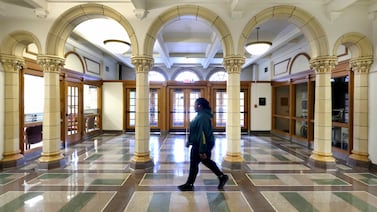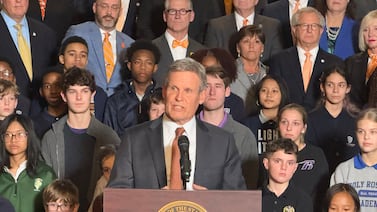Sign up for Chalkbeat Chicago’s free daily newsletter to keep up with the latest news on Chicago Public Schools.
Mayor Brandon Johnson defended his decision to stay on “union leave” from Chicago Public Schools in an interview with Chalkbeat Tuesday.
The mayor taught middle school in CPS before going on leave in 2011 to become an organizer with the Chicago Teachers Union. He launched a political career when he was elected as a county commissioner in 2018 and went on to win the competitive race for mayor in 2023.
Chicago’s mayor still maintains significant power over the city’s public schools even as the city transitions away from 30 years of mayoral control. Johnson appointed school board members during his first year in office and recently replaced that group after all of them resigned amid tensions between the mayor and CPS CEO Pedro Martinez. He selected new appointees and will maintain control over 11 appointments on the new 21-member, partially elected school board.
Staying on union leave allows him to accrue seniority and ensures his job protection, should he decide to return to the classroom. But Johnson denied his employment status is a conflict of interest, because he’s not currently earning a CPS paycheck.
Chalkbeat sat down with Johnson in his office on the fifth floor of City Hall for a brief interview Tuesday to discuss that and other topics like class size, migrant students, and Martinez. The following has been edited for length and clarity.
The school board is going to be sworn in on Jan. 15. You announced 10 of 11 appointments in late December, but have you selected somebody to serve in that 11th seat?
I’m incredibly excited and thrilled and humbled to be the first mayor in the history of Chicago to not only commit to elected representative school board, but see that come to fruition. In my time as an organizer and as a teacher and as a parent, the public education system in the city of Chicago ran by previous administrations have just been abysmal as it relates to showing up for working people. So I am, again, humbled by the opportunity, and we will have a fully appointed and represented board that reflects the values of the people of Chicago.
But you haven’t picked the person to serve in District 8?
We will.
What have you told the school board appointees that you’ve selected so far that you want them to prioritize?
I want them to prioritize what the people of Chicago want. As the first mayor in the history of Chicago to believe in public education so much that I send my children to the public schools in Chicago, I know exactly what parents want. I’m one of them. Smaller class size is something that parents want. And I know that experience too as a public school teacher, by the way, the only mayor in the history of Chicago to actually have taught in our public schools.
I want them to fight hard to ensure that we have libraries and librarians in our schools, social workers and counselors. I told them that we have to fight hard for resources and funding to have psychiatrists and psychologists in our schools, to have a well-rounded, rich curriculum that includes after-school activities, right? The bell rings, learning shouldn’t stop, right?
I told them that we also have to ensure that we are fully funding special education, that we are fully funding our bilingual education. There are parents who do transport their kids from one neighborhood to the other, because their neighborhood does not have all the resources that those families deserve and need. We have to have reliable transportation within our public schools to ensure that families can have reliable access to those resources.
Leading the way in this moment requires us to show up for working people, whether you live on the north side or the southeast side or anywhere else in between that we can be proud of our public school system that prioritizes families.
Class sizes are one of the sticking points in the contract negotiations. As I understand it, there’s disagreement about the caps in the middle grades. You were a middle school teacher.
You know how I feel about this then!
What do you think is an appropriate class size in the middle grades?
In some of the top school districts in the state of Illinois you have some classes that are anywhere from 17 to 22 children. Look, the middle school age is a very critical moment in our child’s children’s development. The middle school age is a transformational and transition time for young people.
As a former middle school teacher, the social and emotional development of a child is critical at that moment, particularly, as we see rises of behavioral and mental health challenges. This is why I fought, and will continue to fight hard for appropriate class sizes, because we want to ensure that children can balance equations as well as draw conclusions, but they should also feel safe and secure in their overall development.
On the campaign trail, you said “who better to deliver bad news to a friend than a friend?” Is there an example you could give of a time you’ve had to deliver bad news in the contract talks right now?
I don’t think there’s any debate that our schools are not fully funded. I wish we had the evidence-based funding model that the state of Illinois has calculated, that $1.1 billion were available to us today. You know, it’s unfortunate that that doesn’t exist.
But that’s not just confined to my friends. That’s the state of Illinois. There’s $3.6 billion that the state of Illinois, just based upon this funding formula, should be appropriated for school districts.
We have this strong triangulation — probably for the first time in the history of Chicago or, I don’t know, for the first time that I’ve ever experienced — with the Board of Education, the mayor’s office, and workers all aligned around the vision for our public schools and that that is progress in and of itself.
Your appointed school board, as one of its last acts, voted to end the contract with CPS CEO Pedro Martinez. You didn’t mention him just now as you were talking about alignment. Who would you like to see lead the school district?
I’ll be perfectly frank with you. I’ve spent most of my time thinking about the 325,000 families that want transformational leadership. They want and elected a mayor who’s a parent and has been a former teacher, and that’s what my focus has been on. This is not about some individual, because there’s not one single individual that can transform our public schools.
The Board of Education will get an opportunity as they have made a decision to go into a different direction, and when that time comes, I’m confident that the interests of the people of Chicago will be front and center as we think about this one position.
But keep in mind, we have 30,000 workers in our Chicago public schools. That’s where my heart is — 30,000 workers who show up every single day fighting for resources to ensure that their students have everything that they deserve and need. It’s the 325,000 children who rely upon our public schools. That’s where our focus should be. That’s certainly where mine is.
Can I ask why you didn’t replace the CPS CEO right after taking office?
Look again, this is not about just one individual. What were we focused on in May 2023? We were focused on [parental] leave. We got it done. We were focused on the evidence-based funding formula to ensure that we are funding our schools based upon needs.
We were focused on our bilingual education. The governor of Texas used human beings to attack us, right? It’s a very nasty way to govern. There are 20,000 more students in our public schools who were bussed from Central or South America. And so that’s what my focus has been on.
It’s not on one individual, right? Because if it was one individual, perhaps, we could find a prototype and plant that person down, and they can overcome systemic racism that has existed in our public schools for decades.
This was not about one individual. This is about the hundreds of thousands of families that are looking to me to fight and advocate on their behalf.
You mentioned the influx of new migrant students. Chalkbeat and Block Club Chicago have reported on the lack of support and staffing for bilingual education in some schools. Do you think the district’s done enough?
No, it hasn’t. This is what I’m saying. We have to have more resources for special education. We know that Chicago Public Schools, historically, has not lived up to the promise and expectation of parents, like when I was in the classroom.
We have not properly supported special education, bilingual education, particularly with this influx. That’s why it requires bold leadership in this moment, and that’s what I’m calling for. This is why I believe that some people are having a tough time with my leadership, because I have been very bold and outspoken about investments, not austerity, not privatization, not cuts, consolidations, closures, all of that crap that destroyed public education in this city,
A story published earlier this week in the Chicago Tribune looked at the wave of expiring special taxing districts, known as TIFs. There is a projected increase of tax revenue that would go to sister agencies, including the Chicago Public Schools. What would you like to see the district do with that additional revenue?
That’s always been my goal — to ensure that the tax dollars that were designed to support these sister agencies, that those dollars actually show up for the people of Chicago.
As far as what we need to see, we need better staffing. We do. We need more staffing. We saw this during the pandemic. One of the reasons why our schools were able to recover, you know, the way they did, is because we actually had paraprofessionals to help support these educators. But we also need to make sure that we have libraries and librarians, social workers and counselors. We don’t talk enough about the number of psychiatrists and psychologists that we need in our schools.
Do you understand how difficult it is when you’re living and trying to survive in a city where disinvestment has been the prevailing form of governance? Kids show up [to schools] who are hungry or unhoused, right? We need to see more support for our unhoused students in the city of Chicago, 20,000 children are underhoused in the city. And so as we ensure that there are more dollars available for these sister agencies, we have to respond to what families want.
We need to make sure that we’re providing support services for special ed, bilingual education, and transportation. We need better staff and stronger staffing in our schools to support these efforts, but we also have to support the entire community so that families are fully supported in a way that gives them the ability to experience the wholeness and the purpose of what public education was designed to do.
Would you ever like to go back to teaching in a classroom in Chicago Public Schools?
I really enjoy being mayor of the city of Chicago. I will say teaching middle school is still the best job that I’ve ever had. I did teach a year of high school, but I really enjoyed teaching seventh and eighth grade.
I haven’t really thought about what happens two terms from now or three terms from now. But I will say this, as mayor of the city of Chicago, I’m committed to making sure that you know the people who do teach, the people who are in our schools, that they know that they have an advocate on the fifth floor, and to ensure that our public schools and our public teachers are fully supported.
You are still on leave from CPS.
That is correct.
A number of people have said that is a conflict of interest.
Right, because at first, folks were saying that it was a conflict because I was on leave from the CTU. When they realized that wasn’t right, then they found another reason to figure out there’s a conflict of interest.
Do you believe that’s a conflict of interest? Have you considered resigning that position, given that you are now no longer on “union leave” because you no longer work for the union?
Let me just say this, there isn’t one. There’s no economic benefit for me as a CPS employee on leave as mayor of the city of Chicago. We have firefighters who are on leave [in] City Council, and they actually vote on their contracts. There are police officers who are on leave and they actually vote on those contracts. I don’t vote on any contract, so there’s no conflict of interest.
It’s not like there’s this classroom just waiting for me that once I’m done as mayor of the city of Chicago, I can just roll back in and start teaching the five causes of the American Revolution. Can I just say this respectfully? I just find it to be quite fascinating that somehow, as a parent, as a public school teacher, that somehow that will be in conflict with me as mayor of the city of Chicago advocating on behalf of the people of Chicago.
I wanted to give you a chance to respond. It’s brought up in Pedro Martinez’s lawsuit against the school board and people are pointing to it as ethically problematic.
Let me just say this, right, there have been board members who have been a part of banks and corporations that benefited from CPS contracts. Board members who were on boards of private charter schools that benefited their friends economically. And what has that done for the people of Chicago?
Now you have a parent, you have a public school teacher, that is advocating on behalf of the public that somehow that’s some sort of conflict. You know what? That’s a conflict to the interest of corporations who want to run our school districts to the ground. And guess what? They’ve done it. But now, with bold progressive leadership, we are rising out of the ashes of those who saw public education as a way to line their pockets, and now we actually have someone who believes in the public good.
Jen Johnson is no longer deputy mayor of education. Have you looked into filling that role?
That’s a very good question. Thank you for that. And let me just say Jen Johnson is a remarkable human being, just a classy human being that has served in this city as a social studies teacher, just like myself. Just a brilliant mind.
We’re going to go through a robust interviewing process to find the right person who understands my vision, the vision that I was elected on to ensure that every single school in the city of Chicago is fully funded and supported. That process continues to unfold. We’ll let you know once we make an announcement.
Becky Vevea is the bureau chief for Chalkbeat Chicago. Contact Becky at bvevea@chalkbeat.org.

